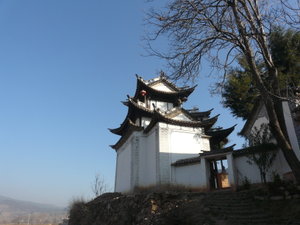Advertisement
Published: January 31st 2011

 The Qing Dynasty Temple.
The Qing Dynasty Temple.
Magical, mythical, mesmerising. Sometimes the silence is so loud it screams at you. Sitting in the walled courtyard complex the shadow of the early Qing dynasty Bai theatre/temple loomed over us. Tales from the past, whispers of the future and a voice from the present wove a web of history, and a tale of personal courage that enchanted and moved me.
Mr. Wu lives in Duan village in the heart of the 'Stone Treasure Mountains'. He is the only person in the village named Wu - the other five hundred inhabitants are all descended from the same family and share one surname - Duan. An old-timer sat next to us as we drank tea. 'The villagers like to come and sit here, this used to be a communal building. People remember'. Mr Wu told us. The old man said nothing, not even to Mr. Wu - just sipped noisily on his tea. We gazed up at the graceful roof, with it's curling edges decorated with dragon fish and roosters. Roosters are a symbol of study, since it's believed a good student should rise at the crack of dawn with the crow of the rooster to begin studying. Elegant black and white line drawings

 The Qing Dynasty Temple.
The Qing Dynasty Temple.
Fields and a 'Shaxi screamer' braying in the foreground. decorated the white plaster walls.
I wondered how such a small village, surrounded by vegetable fields and mountains, had acquired such a magnificent structure. Mr. Wu sighed and said that before the Cultural Revolution this was not uncommon - most villages would've had such a theatre/temple. Now there are only three or four such buildings left. As we talked, Wu Yunxin lead us up a flight of steep, dark wooden steps. The boards creaked and groaned under us, but suddenly we were out in the light, on a platform which had originally been used as the stage. The villagers would've clubbed together to pay a band of travelling performers to put on a show, or entertained themselves during festivals. Now all was silent. 'I like to sit here and read a book in the summer', said Mr. Wu. A view over the courtyard, the rooves of the old village, and the mountains beyond, indeed, encouraged a slowing of pace.
Up another flight of narrower steps to the top floor. And the altar. A curious blue figure, with bright red spikey hair, and teeth that would've made Dracula proud, leaned towards us in a kind of Eros pose. Quite
an ugly duckling! This was Kui Xing - a deity whose sphere of influence includes culture and examinations. Standing on one leg, the other bent and stretched out behind him, on his foot an old Bai food measure - a wooden box, just like one we'd seen downstairs. Layer upon layer of history and legend. The story says that he was a dedicated student, who wanted only to learn, learn, learn. Although he was such a gifted scholar, he was not allowed to study at college. 'You're not normal looking, you'll frighten the other students' his contemporaries told him. Heartbroken, he decided to take his own life, and leapt into the river. The Jade Dragon Emperor sent a dragon fish, which bore him aloft on it's back, to save him. The Jade Dragon Emperor then placed a red brush - used only by gods and emperors - in his hand; to signify that Kui Xing was a genius who didn't need to pass exams to prove it. Students and their parents still worship him in the hope that he will be helpful at exam time.
'This is a new statue, I had it made when we came to live
here'. The original was clay and had been easily smashed during the Cultural Revolution. I thought how fitting it was that Mr. Wu, who himself has a great passion for studying - he was earnestly teaching himself French during our stay, and had been an English teacher at the local school - had re-instated Kui Xing. But how had the temple survived when Kui Xing had not? Mr. Wu's wife's grandfather had rallied the villagers to save the temple. 'He was a kind, gentle man, but during this time people say he became like a madman', Mr. Wu told us. He argued that they must honour their forefathers, show respect for them, and preserve the temple for future generations. He was able to sway the villagers, but they insisted on smashing the statue of Kui Xing.
Full circle. From 1735 to present day. This is a place of learning and culture. A place to socialise, and contemplate. A place of courage and hope. A place where history is almost tangible.
Mr. Wu. Dragonfly Bed & Breakfast. www.teahorse.net
E-mail: shaxi-travel@hotmail.com
Advertisement
Tot: 0.195s; Tpl: 0.011s; cc: 17; qc: 77; dbt: 0.1155s; 1; m:domysql w:travelblog (10.17.0.13); sld: 1;
; mem: 1.2mb









nick bale
non-member comment
Mr Wu
What a great story!